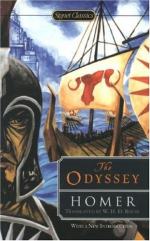In Ithaca, the hero’s home, things seem to have passed smoothly till about the sixth year after the fall of Troy. Then the men of the younger generation, the island chiefs, began to woo Penelope, and to vex her son Telemachus. Laertes, the father of Odysseus, was too old to help, and Penelope only gained time by her famous device of weaving and unweaving the web. The wooers began to put compulsion on the Queen, quartering themselves upon her, devouring her substance, and insulting her by their relations with her handmaids. Thus Penelope pined at home, amidst her wasting possessions. Telemachus fretted in vain, and Odysseus was devoured by grief and home-sickness in the isle of Calypso. When he had lain there for nigh eight years, the action of the Odyssey begins, and occupies about six weeks.
Day 1 (Book i).
The ordained time has now arrived, when by the counsels of the Gods, Odysseus is to be brought home to free his house, to avenge himself on the wooers, and recover his kingdom. The chief agent in his restoration is Pallas Athene; the first book opens with her prayer to Zeus that Odysseus may be delivered. For this purpose Hermes is to be sent to Calypso to bid her release Odysseus, while Pallas Athene in the shape of Mentor, a friend of Odysseus, visits Telemachus in Ithaca. She bids him call an assembly of the people, dismiss the wooers to their homes, and his mother to her father’s house, and go in quest of his own father, in Pylos, the city of Nestor, and Sparta, the home of Menelaus. Telemachus recognises the Goddess, and the first day closes.
Day 2 (Book ii).
Telemachus assembles the people, but he has not the heart to carry out Athene’s advice. He cannot send the wooers away, nor turn his mother out of her house. He rather weakly appeals to the wooers’ consciences, and announces his intention of going to seek his father. They answer with scorn, but are warned of their fate, which is even at the doors, by Halitherses. His prophecy (first made when Odysseus set out for Troy) tallies with the prophecy of Teiresias, and the prayer of the Cyclops. The reader will observe a series of portents, prophecies, and omens, which grow more numerous and admonishing as their doom draws nearer to the wooers. Their hearts, however, are hardened, and they mock at Telemachus, who, after an interview with Athene, borrows a ship and secretly sets out for Pylos. Athene accompanies him, and his friends man his galley.
Day 3 (Book iii).
They reach Pylos, and are kindly received by the aged Nestor, who has no news about Odysseus. After sacrifice, Athene disappears.
Day 4 (Book iii).
The fourth day is occupied with sacrifice, and the talk of Nestor. In the evening Telemachus (leaving his ship and friends at Pylos) drives his chariot into Pherae, half way to Sparta; Peisistratus, the soil of Nestor, accompanies him.




